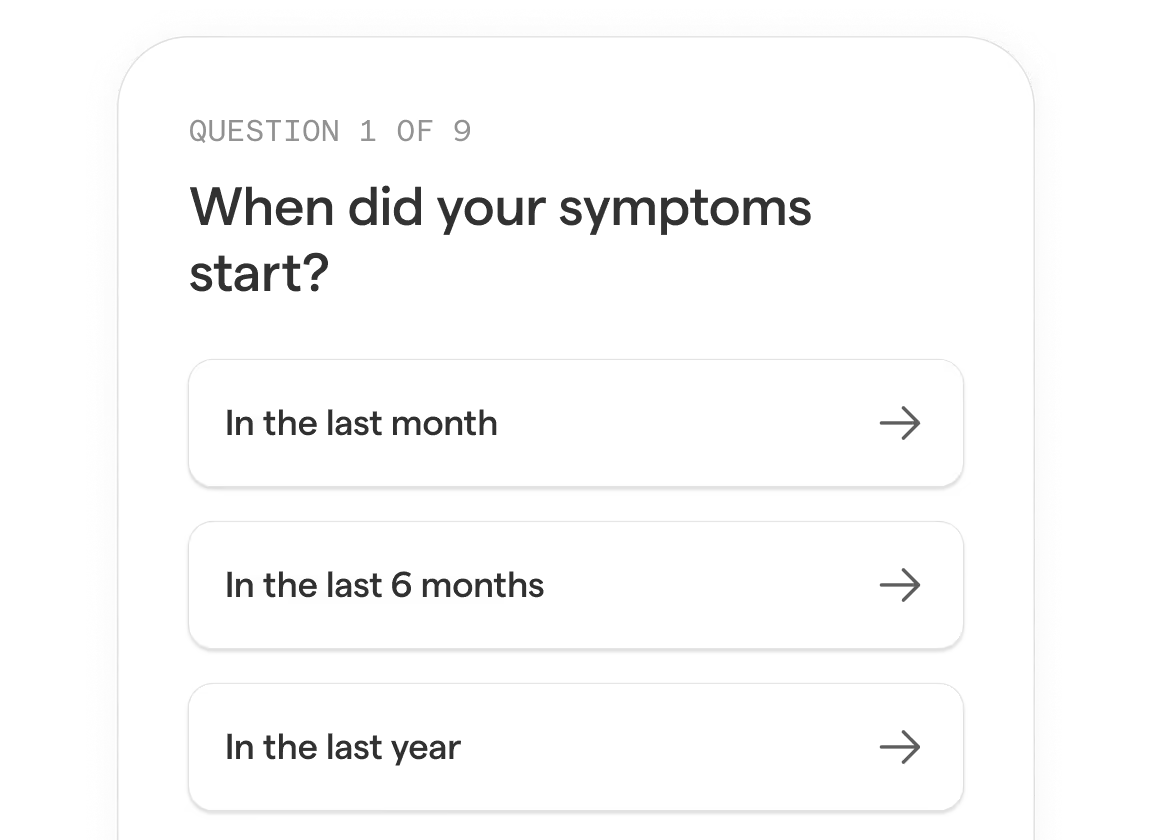Download the Felix App
Earn reward, visit our shop and get exclusive offers on the app
Download now

Through Felix, you can get Nicorette® gum with free delivery to your door!
Nicorette gum is a form of Nicotine Replacement Therapy (NRT), which is used to temporarily relieve the symptoms of nicotine withdrawal and cravings to smoke. Like some other forms of NRT, Nicorette is available in Canada as an over-the-counter medication.
It’s one of many other forms of NRT, such as:
Nicorette gum functions by releasing small amounts of nicotine into your mouth to be swallowed with your saliva and absorbed through your esophagus and stomach lining into your bloodstream.
By replacing a portion of the nicotine that your body is missing from not smoking, Nicorette gum in Canada makes it easier to stop smoking.
In some cases, Nicorette nicotine gum may be used for temporary cessation of smoking needs, when you know you won’t be able to smoke for an extended period of time (i.e., flights, medical appointments, etc.).
Nicotine gum is taken orally and chewed like normal gum.
1. Chew the gum slowly until the tastes become strong.
2. When the taste is strong, rest the gum between your jaw and cheek — the nicotine is absorbed my your mouth's lining.
3. After the taste has faded, resume chewing the gum until the taste becomes strong again.
Keep repeating steps 2 and 3 for about 30 minutes.
It can be used several times a day, though excessive use of Nicorette nicotine gum may increase your chances of side effects like mouth soreness, or the chance of taking in too much nicotine; especially if you’re pairing Nicorette gum with another form of NRT.
The most common side effects of using Nicorette nicotine gum include:
Most people get used to these Nicorette gum side effects over time, so they lessen or disappear completely. If they start to become severe, you should be sure to talk to your practitioner about alternative NRTs you may want to try instead.
Signs of a nicotine overdose could include:
If you start to experience any of these more severe side effects of Nicorette gum, you should spit the gum out and seek immediate medical attention. At very high doses, other symptoms may appear, such as:
Thankfully, allergic reactions (including anaphylaxis) are very rarely occurring with Nicorette nicotine gum.
People under the age of 18, as well as those who are pregnant or breastfeeding shouldn’t use Nicorette nicotine gum.
You should talk to your practitioner before requesting Felix for Nicorette gum in Canada, if you have/had:
They may be able to suggest other NRTs that would work for you in Canada, rather than Nicorette nicotine gum.
Further reading




Answer a few simple questions about your health.

Your healthcare practitioner will build a personalized plan just for you.

We’ll deliver your treatment directly to your home for free in discreet packaging.























Nicotine replacement therapy (NRT) is an over-the-counter smoking cessation treatment, or quit aid, that delivers nicotine to your body in small amounts to help control cravings by easing the uncomfortable symptoms caused by nicotine withdrawal. These products can gradually replace the need for nicotine in smokers while minimizing exposure to the harmful substances found in cigarettes.
One of the hardest parts about quitting smoking is the withdrawal that you feel, because your body craves the nicotine that’s missing from tobacco products.
By replacing some of the nicotine that would be in your system when smoking, it can reduce the severity of your withdrawal symptoms or cravings, as well as help you cut back on how often you’re smoking.
Over time, with commitment and patience, using treatments like ZONNIC may help reduce the urge to smoke and lead to full smoking cessation.
Felix is Canada’s first truly integrated healthcare platform. We provide on-demand treatment for everyday health needs like weight loss, mental health, sexual health, and more. Founded in 2019, our digital-first approach to healthcare includes everything from diagnosis to prescription — all accessible from the comfort of home.
No. Felix provides a faster, hassle-free way for you to get a treatment plan for certain conditions, but our service does not replace your primary care provider. For matters that extend beyond obtaining a lifestyle treatment safely and easily, we encourage you to consult your primary health practitioner in person — whether for checkups, personal health concerns, or to inform them about your current treatments or treatment plans.
Absolutely. Our online assessments have been designed to ask all the necessary questions required for diagnosis. We've worked with specialists to create an assessment process that can provide sufficient information for the healthcare practitioner to determine whether or not you are eligible for a prescription and craft an appropriate treatment plan.
Call 911 or proceed to your nearest emergency room immediately. Felix is not intended for medical emergencies. Once the emergency has been addressed or resolved, contact your prescribing practitioner to inform them of your experience as this may impact your current treatment plan.
Anyone who is 18 years or older (16 or older for acne and birth control prescriptions), and is located in Alberta, British Columbia, Manitoba, Newfoundland and Labrador, Nova Scotia, Prince Edward Island, Saskatchewan or Ontario. We cannot ship treatments outside of these provinces at this time.
After creating an account, you will complete a medical assessment for evaluation by one of the Felix healthcare practitioners.
During your assessment, you will have the opportunity to send your practitioner questions via secure messaging.
In most cases, practitioners will complete your assessment with secure messaging alone but sometimes they may determine you require an audio or video visit and/or further diagnostic testing to help determine the best treatment plan for you.
If your practitioner has determined a prescription treatment is appropriate, they will approve your visit and write you a prescription. Our pharmacy will then ship your prescription to your home.
You’ll be able to message your healthcare practitioner if you have questions or want to make changes to your treatment at any time.
No. We use an asynchronous telemedicine model so you can complete your online visit in your own time and we save your progress so you can come back later to finish it.
If you are completing a visit in the mental health or weight loss categories, your healthcare practitioner may require a phone or video call to discuss your medical profile further during the assessment process.
Most assessments do not require a phone or video conversation. Once a prescriber has reviewed the info in your assessment they will respond to you via secure instant messages that you can access within your Felix account.
If you are completing a visit in the mental health or weight loss categories, your healthcare practitioner may require a phone or video call to discuss your medical profile further during the assessment process.
You can expect to receive a response from a healthcare practitioner within 24 hours of submission. If you’ve been waiting longer than this, please reach out to our Patient Support team through the chat bubble in the bottom right corner of your account or our Contact Us page.
No. A visit with a licensed healthcare practitioner is required for all treatments currently provided through Felix’s service.
Not long. After completing your assessment, a practitioner will generally respond within 24 hours, and often much sooner.
Treatment plans will be processed within 2-4 business days of your approval date if there is nothing blocking fulfillment.
All packages usually takes 2-3 business days. You will receive an email with your tracking number once your treatment has been shipped.
Absolutely. All Felix shipments arrive in a nondescript blister package so you can have your treatment shipped wherever makes sense for you as long as there is someone there to sign for it.
A signature upon delivery may be required.
There is currently no cost to have your treatment shipped to you from our Felix Pharmacy network.
Yes, your security is paramount to Felix’s mission. Personal health information provided during your medical assessment is strictly and legally confidential between you and the Felix healthcare practitioner.
Beyond that, all your account information (including the medical assessment, credit card, and shipping information, etc.) is also stored safely and securely. Felix is compliant with all federal and provincial health privacy legislation. It is our duty to protect your data with comprehensive security infrastructure and stringent data policies to ensure it stays private and secure.
Read more on our Privacy Policy.
Yes! In Canada, only a licensed healthcare practitioner can write a prescription, and only a registered pharmacist can fill that prescription. We are supported by leaders in the Canadian pharmacology and specialized medical fields. Felix adheres strictly to all the regulations set forth by all applicable Colleges of Pharmacists and Colleges of Physicians and Surgeons in which we operate.
Absolutely. All prescriptions obtained via Felix are provided by licensed Canadian healthcare practitioners—the same as you would get at a hospital, doctor’s office, or clinic. These practitioners do not provide prescriptions unless they deem it medically safe and appropriate to write them based on your medical profile and assessment answers. Our assessments have been crafted by the practitioners on our medical team. Finally, all Felix Pharmacies are provincially accredited just like any retail pharmacy.
Your privacy is our top priority. All your data is 256 bit SSL/TLS encrypted, and we take significant steps to keep your data secure. You can read our Privacy Policy for more information.
Felix charges a fee for the online visit. In most cases the fee is $40 but varies by treatment category. The visit fee includes a prescription valid for up to a year (depending on the condition) and on-going support from the healthcare practitioner or pharmacist.
It depends. Treatment costs vary but will be in line with what you would pay at a pharmacy in person. You will see the estimated cost of your treatment before insurance, during the online visit but will only be billed for medication costs for your prescription once it is approved and sent to our pharmacy. Once approved, your treatment and payment will be processed within one to two days.
Keep in mind that you won’t necessarily need to pay the full price yourself. If you have insurance, Felix’s partner pharmacies will bill your insurer directly. You may also be eligible for financial support in your province.
We accept all major credit cards for any aspect of your treatment not covered by insurance or other financial support
Treatment coverage varies greatly between different insurance plans.
The good news is that if you are covered, Felix can bill your insurer directly, and then process your treatment plan at no additional cost to you. We recommend that you upload your private and/or provincial benefit card during the online visit so that our pharmacy partner can apply any coverage you are eligible for before processing your treatment plan.
Insurance coverage for treatment plans through Felix doesn't include the cost of your visit.
A Felix online visit is considered asynchronous since it is conveniently completed through a secure chat bases system. Currently, asynchronous visits are not covered by insurance or provincial health plans so you will be charged a visit fee, depending on the category of treatment you are requesting.
Medication coverage varies greatly between different plans, provinces, and has specific criteria that determine eligibility. For private insurance, we recommend contacting your benefits administrator with your details and the Drug Identification Number (DIN) and the drug name to determine your coverage.
For more details on provincial health plan coverage see below:
Alberta: Learn more about AHCIP here. Search for covered drugs here.
British Columbia: Learn more about MSP here. Search for covered drugs here.
Manitoba: Learn more about MHSIP here. Search for covered drugs here.
Newfoundland and Labrador: Learn more about MCP here. Search for covered drugs here.
Nova Scotia: Learn more about MSI here. Search for covered drugs here.
Ontario: Learn more about OHIP+ here. Search for covered drugs here.
Prince Edward Island: Learn more about Health PEI here. Search for covered drugs here.
Saskatchewan: Learn more about Saskatchewan Health Coverage here. Search for covered drugs here.












